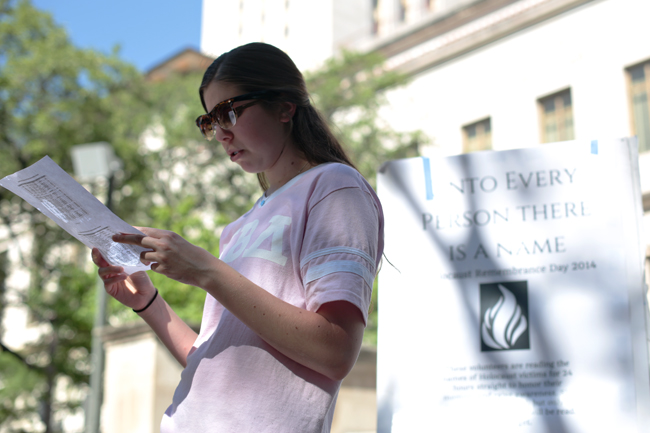Throughout Sunday night and for most of the next day, volunteers read the names of thousands of Holocaust victims in recognition of Holocaust Remembrance Day.
Aaron Liener, Hebrew language and literature senior and one of the main event organizers, said the goal was to read at least 20,000 names continuously from Sunday at 5 p.m. to Monday at 5 p.m. According to Liener, it would be impossible for anyone to read all of the names of the six million victims of the Holocaust in less than nine months.
“If we did that, [it would be] 277 consecutive days of reading these names,” Liener said. “It helps people grasp the concept of six million people.”
Liener said the biggest issue organizers faced when planning the event was recruiting people to sign up to read names. According to Liener, many did not fill the early morning time slots until 48 hours before the event, and Meital Boim, journalism and nutrition junior, said some people read without signing up at all.
“People who thought they weren’t going to have time to read would drop by in the middle of the day and say, ‘Hey, I have five minutes. Do you mind if I read a sheet even though I didn’t sign up?’” Boim said. “Lots of people were interested.”
Boim, who had three of her four grandparents affected by the Holocaust, said many people may not have understood the importance of the event unless they heard the name of a concentration camp as it accompanied one of the names of the victims.
“I think when people were walking by, they probably heard a word like Auschwitz or Treblinka and realize that this was something to commemorate the Holocaust,” Boim said. “I think just realizing for one minute that this day has a greater significance than just what classes they’re going to and what homework they need to do and what they’re having for lunch … that they could step out of their bubble for the two seconds that they walk by here is really good enough for me.”
Tomer Maron, an Israel fellow for Texas Hillel, said he participated in the event to remember the people who lost their lives.
“I read maybe 50 names or so, but those 50 names will not be forgotten,” Maron said. “I read them. I will remember some of them, and hopefully every student who passed remembered a name, or heard one name, even. Make sure those people are never forgotten.”




















